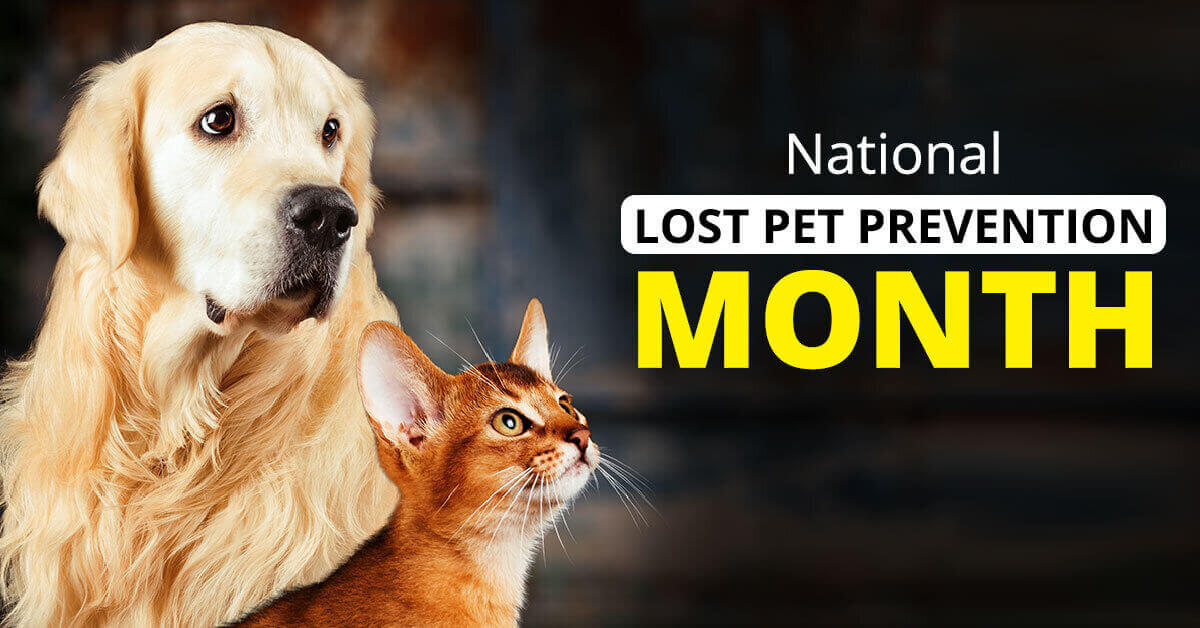A lost pet is a lost family member. The uncertainty of their whereabouts, their well-being, and imagining just how lost they must be feeling is heart-wrenching.
Unfortunately, the case of lost or missing pets has been around for many years – primarily because of the lack of awareness among owners and pet parents, who often don’t understand the necessity of everyday measures to secure their pets.
The National Lost Pet Prevention Month is a step towards educating parents about going the extra mile of just adopting or buying (we don’t recommend that) a pet.
We are here to help you through the unfortunate incident of losing your pet, safeguarding them, and giving an in-depth insight into the National Lost Pet Prevention Month.
Lost Pets: How do they Go Missing?
There are quite a few reasons why pets might go missing.
The adventurous souls are often the first to run away. This type wants to know about the world beyond, and curiosity always gets the better of them. They might dig their way out of an enclosed backyard, break off the leash or jump out the window of a moving car.
Apart from exploration, abuse at home and pitiable living conditions also drive pets away from home who are often found by kind strangers and led to national shelters. Sometimes, they are attacked by wild animals, which makes their return impossible.
In the case of cats, a lot depends on their mood and mental well-being. If they are physically or emotionally hurt, they tend to seclude themselves. It is as if they don’t want to be found, making it difficult to locate even if they are in the neighborhood. Cats tend to curl themselves up in warm places like cars and, as a result, sometimes, are transported to different locations, unknowingly.
Reports also show that most pets often go missing in July than any other month of the year. The summer weekend of the 4th of July may be the reason when people go camping with their families, and the celebrations have all the attention. They might stay at home and celebrate with firecrackers as well.
However, in all circumstances, these celebrations and unfamiliar environments often distress pets. They are unable to cope with the chaos and the noise and end up running away in search of a safe haven.
Lost Pet Prevention
Since the pandemic allowed us to stay at home with our pets, it is easy to be complacent about their safety. However, with offices opening up and life coming back to normal, it is important to ensure that your pet is safe and sound when you work.
This brings us to lost pet prevention. This National Lost Pet Prevention Month, let’s take a look at some simple yet effective measures you can take to ensure that you don’t go through the ache of losing your pet.
ALSO READ: 9 Pawsome Gifts for Pet Lovers
1.No Compromise on Supervision
Whether you have a young one or an adult pet, a keen eye is always essential to ensure they don’t run away. When scared, dogs often slip away from their leash and make a dash for safer surroundings. They often run into a crowd, only to be found never again. Unattended pets, especially dogs, are the ones that often go missing.
Rule of thumb: When outside, be vigilant about your pet’s activities and behavior.
2. Tag Your Pet
A pet’s identity makes it easier for him/her to be reunited with their owners. Having a collar with your pooch’s name as well as your name and contact details is very helpful as well-intended strangers often drop them off. Ensure that tags are a snug fit and have a two-finger gap between them and your pet’s neck.
3. Microchip Your Pet
The microchip is another fool-proof preventive measure that allows vets and local shelters to locate your lost dog’s address and bring him/her back to you. A microchip is a radio-frequency identification transponder that has your dog’s unique identification number. It is injected into the loose skin between their shoulder blades and does not have the risk of falling off like tags.
4. Positive Training
While it is important to tag and microchip your pets, giving them positive reinforcement training right from the start reduces the chance of running away. Instead of scolding them every time they escape, try using positive techniques like rewards when they return or when you notice them resisting an urge to run away.
This training should be consistent and requires endless patience. However, it helps your pets understand the difference between right and wrong in a gentle yet firm manner.
Here’s a tip:
- Prep your dog for a walk and take them to the door.
- Once you open the door, loosen your grip on the leash and ask them to stay.
- Reward them with their favorite treat.
- Continue this until it becomes a habit. This session will teach them that patience is rewarding and also not to go anywhere without you or supervision.
5. Pet-Proof Your Home
Securing your home is very important to ensure that your pet isn’t tempted to make a run for it. Check for the latches on doors and windows, have a mesh door to let the air out but your pet in.
In case of special circumstances like renovations or if you are moving, ensure that your pet is in a closed room or a crate, just until the doors and windows can be closed again.
You can also keep an eye on your pooch using the Waggle Pet Camera. This efficient pet camera and food dispenser allow you to stay close to your pet even while you are away.
This National Lost Pet Prevention Month, let’s take up the responsibility of building awareness around the need to safeguard our furry family members, adopt all measures to protect them, and help those who have lost their pets.









